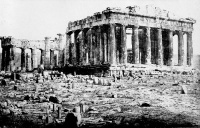Classical Greece
From The Art and Popular Culture Encyclopedia
| Revision as of 22:57, 31 March 2014 Jahsonic (Talk | contribs) ← Previous diff |
Current revision Jahsonic (Talk | contribs) |
||
| Line 1: | Line 1: | ||
| [[Image:Western face of the Greek Parthenon.jpg|thumb|right|200px|[[1872]] [[photograph]] of the western face of the [[Greek]] [[Parthenon]]]] | [[Image:Western face of the Greek Parthenon.jpg|thumb|right|200px|[[1872]] [[photograph]] of the western face of the [[Greek]] [[Parthenon]]]] | ||
| {{Template}} | {{Template}} | ||
| - | '''Classical Greece''' was a 200 year period in Greek culture lasting from the 5th through 4th centuries BC. This classical period had a powerful influence on the [[Roman Empire]] and greatly influenced the foundations of [[Western Civilization]]. Much of modern Western [[politic]]s, artistic thought, such as architecture, scientific thought, [[literature]], and [[philosophy]] derives from this period of [[History of Greece|Greek history]]. In the context of the art, architecture, and culture of [[Ancient Greece]], the '''Classical period''', sometimes called the '''Hellenic period''', corresponds to most of the 5th and 4th centuries BC (the most common dates being the fall of the last [[Athenian tyranny|Athenian tyrant]] in 510 BC to the death of [[Alexander the Great]] in 323 BC). The Classical period in this sense follows the [[Archaic Greece|Archaic period]] and is in turn succeeded by the [[Hellenistic period]]. | + | '''Classical Greece''' was a period of around 200 years (5th and 4th centuries BC) in Greek culture. This [[Classic]]al period saw the annexation of much of modern-day Greece by the [[Achaemenid Empire|Persian Empire]] and its subsequent independence. Classical Greece had a powerful influence on the [[Roman Empire]] and on the foundations of [[western culture|western civilization]]. Much of modern Western [[politics]], artistic thought ([[Ancient Greek architecture|architecture]], sculpture), scientific thought, [[Theatre of ancient Greece|theatre]], [[literature]], and [[Ancient Greek philosophy|philosophy]] derives from this period of [[History of Greece|Greek history]]. In the context of the art, architecture, and culture of [[Ancient Greece]], the '''Classical period''' corresponds to most of the 5th and 4th centuries BC (the most common dates being the fall of the last [[Athenian tyranny|Athenian tyrant]] in 510 BC and the death of [[Alexander the Great]] in 323 BC). The Classical period in this sense follows the [[Archaic Greece|Archaic period]] and is in turn succeeded by the [[Hellenistic period]]. |
| == See also == | == See also == | ||
| *[[Classical antiquity]] | *[[Classical antiquity]] | ||
Current revision
|
Related e |
|
Featured: |
Classical Greece was a period of around 200 years (5th and 4th centuries BC) in Greek culture. This Classical period saw the annexation of much of modern-day Greece by the Persian Empire and its subsequent independence. Classical Greece had a powerful influence on the Roman Empire and on the foundations of western civilization. Much of modern Western politics, artistic thought (architecture, sculpture), scientific thought, theatre, literature, and philosophy derives from this period of Greek history. In the context of the art, architecture, and culture of Ancient Greece, the Classical period corresponds to most of the 5th and 4th centuries BC (the most common dates being the fall of the last Athenian tyrant in 510 BC and the death of Alexander the Great in 323 BC). The Classical period in this sense follows the Archaic period and is in turn succeeded by the Hellenistic period.
See also


